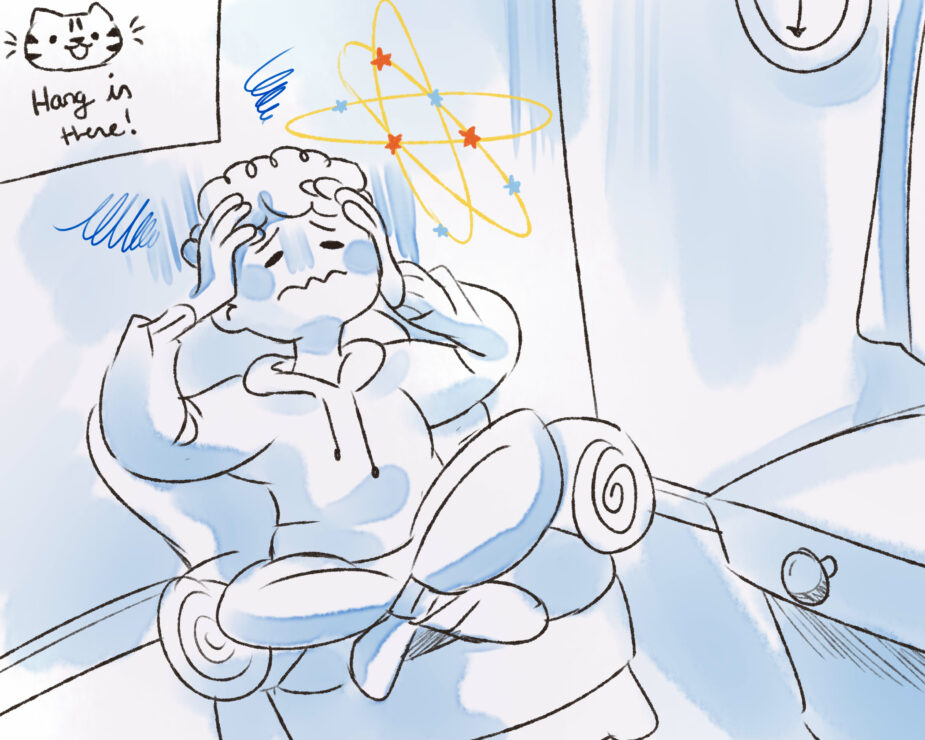Our acute stress systems are not evolved to handle pandemics

Flip-flopping restrictions. New sub-variants. Never-ending uncertainty. These are the parameters that have defined our lives for two years. It’s normal to feel stressed out and unsafe nowadays, yet it does not feel like our bodies have acclimated to this “new normal.”
Shouldn’t humans be experts at existing in long-term, stressful situations at this point? As it turns out, we never have been.
Situations of intense, prolonged stress are not what humans are evolved to handle. Dr. Lisa Kalynchuk, UVic’s vice president of research and innovation and an expert on chronic stress, explains how our acute stress systems are not designed to handle pandemics.
“Our bodies have evolved a homeostatic system that allows us to cope with acute stressors,” said Kalynchuk in an interview with the Martlet. “Our immediate acute bodily response is meant to protect us from the harm of that threat.”
Hurricanes, a bear attack, or a stranger following you down a dark street are acute threats. Give humans something immediate, something tangible, we can see with sharp teeth and our bodies will harness its resources to help us fight or run away from the threat. Once we have assessed that the threat is gone and we’re safe, our bodies will calm down, and those physiological changes that occurred will return to normal.
A long-lasting, unpredictable, and uncontrollable threat? Now that’s a situation humans are not well equipped for, and it’s the perfect recipe for chronic stress. Chronic stress is defined by Yale Medicine as “a consistent sense of feeling pressured and overwhelmed over a long period of time.”
“In a pandemic … the acute stress system never gets to shut off,” Kalynchuk explains. “It stays on. So you get high circulating levels of stress hormones which then has all sorts of physiological effects on people.
“Putting yourself in a situation where you’re exposed over the long term to uncontrollable events that are unpredictable, and that have the potential to be life-threatening — that’s the worst possible situation you can be in.”
When we sense danger, our amygdala kicks into action and sends warning signals to the hypothalamus, which produces stress hormones like adrenaline and cortisol. As the pandemic has been a constant threat in our lives for two years now, and we haven’t seen the signs that the threat is gone and we’re safe again, our bodies are overproducing stress hormones, which can have detrimental effects on our health.
But, what are the signs that chronic stress is taking a toll on our bodies?
“Some people might start getting headaches, they might have changes in appetite, they might have trouble sleeping. They might socially withdraw,” said Kalynchuk. Sometimes, the long-term impacts of chronic stress aren’t always health-related. When we can’t cope because of anxiety, some people make rash decisions they later regret, such as quitting a job, dropping out of school, or breaking up with a partner. Kalynchuk said that having to go back and to try to fix that can be quite damaging.
Humans and chronic stress go together like oil and water, but luckily, there are ways to cope. Maintaining social networks is essential, as there’s evidence to show that people who maintain social contact have more resiliency and are able to bounce back faster when it comes to stress.
Exposing yourself to new or novel situations can have beneficial effects, such as going for a walk in a new park or changing up which coffee shop you like to visit.
“That kind of novelty is actually really healthy for our brains … even if it’s really small. Take your dog for a walk in a different direction than you normally go,” said Kalynchuk. “It’s amazing how those things can actually add up and have really beneficial effects.”
While learning how to manage chronic stress is a vital skill now and for the future, it isn’t something we want to have to think about every day. After two years, we’re exhausted. But Kalynchuk has a hopeful message for anyone who feels like the dark days are eternal. As a species, we are resilient. Even after long periods of stress, people tend to recover quickly once the stressor is removed.
“I would encourage people to try to find those positive coping mechanisms and just keep yourself going … If you’ve persevered this far, maybe try to find a way to persevere a bit more because I’m pretty confident that we’re turning the corner, and things will get much better.”






